Contents
This page contains issues of the MPA Direct November 2009 issue.
Warning: This is archived material and may be out of date. The Metropolitan Police Authority has been replaced by the Mayor's Office for Policing and Crime (MOPC).
See the MOPC website for further information.
MPA Direct - November 2009
Issue 11
This issue of MPA Direct is available as PDF document. Or alternatively a summary version is available below.
Full Authority: 26 November 2009
Mayor Boris Johnson, Chair of the MPA, welcomed everyone to the November meeting of the full Authority and informed the audience that it had been a busy month since the last meeting in October.
Two public safety campaigns are currently underway: safer travel at night and a new cinema, TV and poster campaign urging women not to use unofficial black cabs but take official mini cabs or black cabs during the party season.
Victoria Borwick gave a speech at the Association of Police Authorities Conference on 25 November about police accountability and public redress (see the press release later on) as well as hosting a public meeting in London’s Living Room at City Hall on 5 November to debate public order policing (once again see the press release further on). The Gangs panel has convened for their first meeting and several JEMs meetings with London boroughs have been held. The MPA had celebrated the 90th anniversary of female police officers and on the afternoon of 26 November a commemorative service was held at Hendon for all police officers who have lost their lives in the line of duty. A joint HMIC and Audit Office inspection of the MPA will begin in-house on Monday 30 November, although inspectors have already been attending various meetings at the Authority and in boroughs across London. It is anticipated that the inspection report will be available in the spring.
The first agenda item was a petition delivered by Mary Honeyball MEP seeking the retention of the MPS dedicated human trafficking unit:
'We the undersigned petition the Commissioner of the Metropolitan Police, Sir Paul Stephenson, to retain its dedicated specialist unit dedicated to combating the crime of human trafficking’.
Catherine Crawford replied formally. Mary Honeyball MEP responded by confirming that the expertise of Met’s trafficking unit is held in high esteem in Europe and that losing this experience would be detrimental prior to the Olympic Games in London, given her knowledge of how these issues impacted on the World Cup when held in Germany.
The Commissioner Sir Paul Stephenson agreed it is a very serious issue and assured the Authority that it is being treated as such. The Met is currently carrying out a review that will be presented to the Met’s SMT on the 8 December and come to the full Authority in January. The Commissioner’s report to the Authority followed. He opened by confirming that youth murders are down on this time last year and credited the impact of Blunt 2 for this achievement. He added that although the figure now stands at 12 deaths in 2009 compared to 29 in 2008, ideally that number would be zero.
However, Sir Paul also confirmed that rapes are at their highest level for many years and he is concerned that the number has increased by almost a quarter year‐on‐year. It was not clear if a surge in offences or an increase in the confidence of victims to go to police was behind the disturbing figures. There were 277 rapes recorded in the capital in October, an increase of almost 70% on the 164 recorded in the same month last year. He added that the Met are working hard ‘drilling down’ on available research and statistics to try to find the underlying reason for this increase.
The ‘Bumblebee’ anti burglary campaign continues to be successful and arrests and charges for burglaries are up, although this crime category continues to be a problem, which may be in part due to the current financial climate. Referring to Operation Minstead the Commissioner said the arrest of a man in connection with the inquiry, which involved burglary and rape of elderly people in South East London over a 19 year period, was extremely significant, but he was unable to say more. The man has been charged and therefore the subject is sub judicae.
Members then went on to put several issues to the Commissioner. These included whether large shopping centres have to pay for their policing. The Commissioner confirmed that policing costs inside private premises falls to the owner and not the Met, but in many cases the local council will come to a financial agreement with the owners to ‘buy’ more police from their local borough to patrol inside the centres.
The HMIC report into policing protest (part two) was also discussed. Sir Paul confirmed that the recommendations from part one of the report concerning containment issues had been implemented in the Met but part two of the report addressed national policing issues. He added that the Met would assist, guide and lead on the national scene and work hard to implement the report’s recommendation before the Olympics. Several members were keen for the Commissioner to confirm that the Met’s policing strategy for the ‘Climate Camp’ protest held in the summer in South East London was in fact the way forward for policing protests. As ever the crux of the issue is to balance both the rights of people to protest peacefully with the rights of individuals to be able to go about their daily business. But the Commissioner did concede that the Met have to address how policing protest should be escalated if that is what is needed, and that certain types of equipment should not be worn or used unless it is necessary.
Other issues discussed included police presence at A&E departments in hospitals during the Christmas ‘party’ season, the ACPO led proposals for a register of domestic violence offenders, displacement of burglary gangs borough to borough across London, gun grime and dogs as weapons replacing knife crime, and the policy of fixed penalty notices and cautions as a means of dealing with offenders rapidly. Assistant Commissioner Tim Godwin spoke briefly about the pilots for ‘virtual‘ courts that will be underway in London in the New Year which means offenders could appear before a court within two hours of the offence being committed.
Finally, after some discussion, the Authority agreed the MPA/MPS Budget and Policing Plan for 2010/13, although the budget elements will remain draft until the final sign off by the Mayor in February 2010. Members noted with approval that the Met Forward strategy had been incorporated into the Plan, the Met Forward symbols for the eight work programmes making this convergence more clear.
Catherine Crawford’s response to the Petition:
“This matter is the subject of a wider review of how the MPS responds to organised immigration crime and is being led by Commander Simon O'Brien. The MPS response currently operates over a number of command units (OCUs) and business groups. Included within this review is how the MPS approaches human trafficking in all its forms, including for sexual exploitation, domestic servitude and labour exploitation. The focus of the review is to improve the MPS' response to all areas of organised immigration crime and the very important issues that emerge from the exploitation of vulnerable people, especially women and children.
“A significant amount of consultation has been conducted and views continue to be sought from a wide variety of stakeholders. “At the last meeting of the full Authority, the Commissioner gave clear assurance that once the review has been considered by the MPS Management Board (now scheduled for 8 December 2009) a report would be prepared for the MPA.”
Remembering the courage of officers who made the ultimate sacrifice
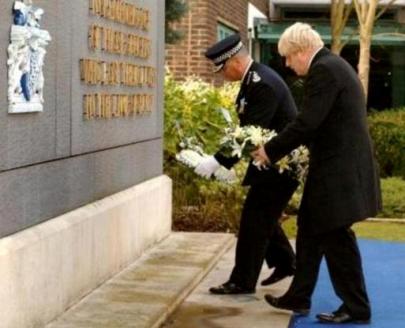
This was the seventh annual memorial service and was held at the memorial garden in the grounds of the Hendon Training College after full Authority on Thursday 26 November.
Commissioner Sir Paul Stephenson said:
"Today we are reminded of the dangers that police officers face every day, and of the courage and selflessness they display in choosing to serve their community despite these dangers.
“We must never forget those men and women who have laid down their lives in selfless service to the people of London. It is incredibly humbling to hear their stories and consider the sacrifice they and their families have made. London remains a great and safe city because of them."
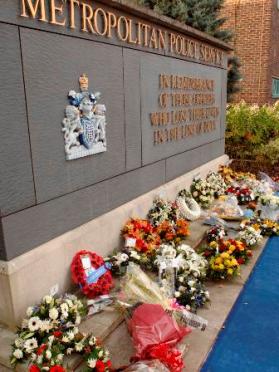
"This is a truly humbling occasion and a chance to state the utmost respect and admiration I hold for those Metropolitan Police officers who have made the ultimate sacrifice in the line of duty. There are only a few other professions where so much is asked of its staff. There are thousands of men and women within the Service who run towards danger when others automatically run away.
“Dedication such as this, and on a daily basis, is truly inspiring and without which would make this city a poorer place."
A Book of Remembrance, which was signed and dedicated by Her Majesty the Queen in 2001, was on display for relatives to view the entries for their loved ones. A list of those included in the Book of Remembrance can be found at: www.met.police.uk/history/remembrance.htm
Wreaths were laid by the Commissioner, the Mayor and families and friends of officers. The last post was then sounded and a minute's silence was observed.
Crime and safety are the biggest issues for Londoners
The MPA’s job is to make sure the Metropolitan Police fight crime effectively and keep the capital safe.
Our new strategic framework, Met Forward, will build on the Met’s achievements and sets out how we want them to reduce crime and criminality, increase public confidence and provide value for money.
Met Forward is the MPA's mission statement for London's police
The job of the MPA is to fight crime by getting the best out of the Met.
Met Forward sets out how we want the Met to reduce crime and criminality, increase public confidence and provide value for money.
- Met streets: public safety is the first duty of the police.
- Met specialist: expert services support front line policing, counter-terrorism and action against serious crime and disorder
- Met partners: many agencies work with the police to tackle crime and safety issues
- Met connect: we need to listen better to you, the people we serve
- Met people: our people are our most valuable resource and we need to look after them
- Met Olympics and Paralympics: the MPA will ensure that the Met delivers a safe Games
- Met support: we will continue to improve our infrastructure
- Met standards: excellent performance and efficiency should be recognised and rewarded
Focusing on fighting crime the MPA mission
90 years on: women policing London
On Tuesday 24 November the Met celebrated 90 years since the first female police officers took to the streets of London. To celebrate, retired and serving female officers from across the MPS attended an event at the MPS historical archives - 'The Met Collection' - in West Brompton.
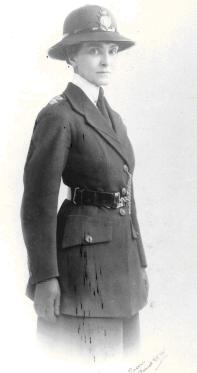
Flash forward to 2009 and now one in four officers - over 8,000 in all - are female, some of whom lead from the top: this year the MPA appointed Cressida Dick to the role of Assistant Commissioner, Specialist Crime, the most senior female officer in the history of the Met.
The Met’s first woman officer, Superintendent Sofia Stanley
Catherine Crawford, MPA Chief Executive, said:
"I am very proud to represent the Metropolitan Police Authority at this celebration of 90 years of women in policing. During the nine years the Authority has existed we have been working hard with the Met to help bring about modernisation in our police service. It is very gratifying that the number of female police officers and staff has grown so rapidly and now work alongside their male counterparts in all areas of the Met, making an equal contribution to keeping London safer for all of us. I congratulate everyone who has contributed to this achievement over the years and I am confident that present day colleagues will continue to drive forward equalities and fairness for all in the Met."
Cressida Dick, Assistant Commissioner, Specialist Crime, said:
"The Metropolitan Police Service has changed substantially, even during the time that I have been here. Many courageous and pioneering women over the last 90 years have overcome barriers to prove that all jobs within the Met are suitable for both sexes. The Met is an immensely rewarding, interesting and challenging place to work and I would encourage other women who want a fulfilling career to consider joining and taking the organisation through the next 90 years."
Sioban Clark, Chairman of the Metropolitan Women's Police Association, said:
"To achieve 90 years is a great thing when it was against all odds. I am sure all the women that have gone before us would be very proud of our achievements, who knows, maybe by our 100th anniversary there will be a female Commissioner."
Here are some interesting key facts:
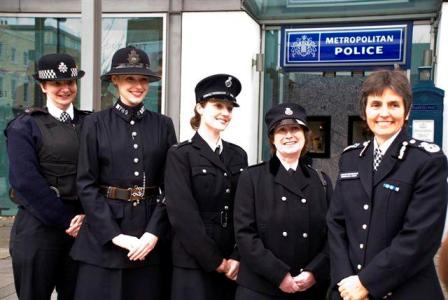
- Police Officers (8,029) 23.77%PCSO (1,609) 35.10%
- Police Staff (8,870) 59.61% Metropolitan Special
- Constabulary (863) 30.29%
- Traffic Wardens (167) 59.64% Grand Total (19,538) 34.66%
Key dates - a historical timeline:
- 1919: women police established in London, the first Metropolitan Police Women Patrols taking to the streets on 17 February 1919. They had no power of arrest
- 1923: women given power of Arrest
- 1928: women over 21 given the right to vote
- 1937: women authorised to take fingerprints
- 1939: outbreak of war - women police officers take on extra duties and responsibilities. Strength 128 uniform and 8 CID
- 1948/49: women admitted to the police federation. Age limit lowered to 20. Strength 235 uniform and 21 CID
- 1955: awards of the George Medal to WPS Ethel Bush and WPC Kathleen Parrott for courage in service during an investigation into sex offences
- 1959: strength 429 uniform and 49 CID
1970: women appointed to Mounted Branch
- 1971: first women appointed as dog Handlers
- 1985: modern uniforms introduced with reinforced bowler hats
- 2009: Cressida Dick appointed as Assistant Commissioner for Specialist Crime, Britain's highest ever ranking woman police officer
Patricia Pratt, a former flying squad officer, attended the event. In November 1963 Patricia, now retired at 72, was sent to a front door in St John's Wood after information emerged Roy James, one of the great train robbers, was hiding there. Armed only with a large dummy parcel, Mrs Pratt sent colleagues in after hearing a curtain rustle upstairs. They charged through the door and after a rooftop chase caught James, known as ‘The Weasel’, and recovered £300,000.
MPA November statement
MPA response to HMIC report on policing public protest
26 November 2009
The MPA welcomed the publication of Her Majesty’s Inspectorate of Constabulary’s (HMIC) report ‘Adapting to Protest’ on 25 November 2009. At its core lies the issue of how we expect the British police to respond to the legitimate right of the public to protest.
The British public has the inalienable right to protest peacefully, while the police need to balance this against the important duty to maintain public order and safety. The work undertaken by HMIC has made recommendations that provided a clear direction for change. The detailed implications for the Metropolitan Police Service (MPS) will need to be embedded into operational police practice and the MPA will expect the Commissioner and his senior management team to report progress to members at future full Authority meetings.
In response to genuine public concern raised by events at the London G20 protests, the MPA has already established a Civil Liberties Panel as part of Met Forward, the Authority’s mission statement for the MPS. The panel is conducting a review of public order policing and has already gathered evidence from members of the public, civil liberties and campaigning groups to seek a balanced view of how the police need to adapt to accommodate legitimate protest.
HMIC’s endorsement of police authority oversight of policing protest is a welcome recognition of the real value of independent scrutiny administered in the name of local communities.
MPA Vice Chair Kit Malthouse, speaking next week at the MPS’s ‘International Public Order Conference’, will reiterate the fundamental concept that the police should facilitate peaceful protest, and outline the MPA’s determination to ensure that public order policing evolves in the light of the public and media scrutiny that followed the G20 summit in April.
MPA November press releases
MPA Civil Liberties Panel: Public order policing - Londoners have their say
72/09
6 November 2009
The Metropolitan Police Authority’s Civil Liberties Panel held an open meeting at City Hall on Thursday 5 November to hear directly from environmental organisations, protest groups and individual campaigners about the policing of demonstrations in London.
The meeting enabled participants, as well as those who could not attend but submitted written evidence, to voice their concerns about the nature and future direction of the policing of events. Victoria Borwick, chair of the panel, said:
"This has been a valuable exercise and will positively inform the Civil Liberties Panel’s final report which will contain specific recommendations to the MPS to change the way they police demonstrations and protests for the better.
“This was the first time the Civil Liberties Panel has met with the public and we were overwhelmed by the positive response. I’d like to thank everyone who attended and all the people who sent in their contributions, and I would remind everyone that this is ongoing and we welcome your views – please can you let us have your comments by the end of the month so that we can include these in our study. Key words we heard again and again were sensitivity and proportionality.
“I speak on behalf of the whole MPA when I state that demonstrating in public is an inalienable right of each and every one of us. What we are seeking to do is influence and thereby improve the way our police plan for, and facilitate, demonstrations."
Major themes which emerged during the meeting included:
- the policing of demonstrations must be proportionate and start from the belief that it will be a peaceful event rather than planning for a ‘worst case scenario’;
- police must differentiate between the vast majority of peaceful demonstrators and the small minority who wish to cause problems and react sensitively to each;
- the variety of laws must be enforced proportionately. There are too many instances of anti-terrorist legislation being applied over-rigorously and in questionable circumstances;
- an overwhelming recognition that it is unacceptable for police officers not to be clearly and permanently identifiable;
- police communication with the broader public via the media must be factual and objective, and should not present demonstrations as potential conflicts;
- the police should facilitate open media coverage of events and not impede access;
- recognising the diversity of protestors and the needs of individuals and groups, for example older people, families with young children and the disabled;
- recognising the needs of demonstrators who may need assistance to exit a situation or require medical assistance;
- concerns about the Territorial Support Group (TSG), their ability to police demonstrations proportionately and concerns about their selection and the focus of their training.
To add a degree of balance to the debate, the panel asked those attending for any examples they had of events that had been successfully policed. The consensus was that the Blackheath Climate Camp of August 2009 was far more sensitively policed, although concerns were still raised about the filming and photographing of those who attended the event.
In conclusion, Victoria Borwick said:
“The first hand experiences we heard will help us to understand the deep concerns that some members of the public have expressed around the policing of public protest; and this evidence gathering will inform our final report.”
NB. Don’t forget that a web cast of the civil liberties panel’s open meeting is available to view on our website.
MPA: Victoria Borwick tells APA conference ‘the buck stops here’
75/09
25 November 2009
Metropolitan Police Authority member Victoria Borwick, speaking at the Association of Police Authorities conference in Nottingham today (Wednesday 25 November) addressed the debate on police accountability and public redress.
She said:
“In London the Mayor is now Chair of the Police Authority. He was elected with a clear mandate to fight crime. The MPA has responded to this by setting out our plans for the future and the role a visible police authority can play in achieving a balance between local accountability, the Home Office and the police.
“When the new Authority came in, we wanted a strong focus on fighting crime so we developed Met Forward, the strategic framework for how the Authority wants the Met to develop and perform in the years to come. Met Forward is a significant development in visible, clear accountability for the police in London.
“Police accountability is central to the current national debate. But democracy is a system of government where elected politicians make political decisions to carry out the wishes of the people who elected them.
And it is directly through the political process that we, as police authorities, are fully accountable ‘fierce advocates’, democratically working to set the policing priorities for our local area. Ultimately in London the buck stops with the Mayor, Boris Johnson.
"This is not a party political issue, it’s a democratic issue. Authority members must be confident and clear about what we mean by holding chief constables to account and securing effective and efficient policing for our areas. And we must challenge the notion that it is not our job to establish the policing priorities for our area or to question operational policy on the grounds that this is too political and ‘undemocratic’.
“Authorities have plenty of statutory powers – both to deliver accountable policing and enable partnership working. All we need is tangible support from the Home Office to help us to deliver our functions as best we can.
On the issue of ‘public redress’ Victoria Borwick continued:
“Police authorities are in touch with the people that the force serves. We were set up to do this. What would be the added value of establishing ‘redress’ or ‘compensation’ or other channels for general complaint to the IPCC and the Inspectorate? The IPCC has a very important and specific role in respect of complaints: they should not get distracted by dealing with general dissatisfaction or failure to deliver on the policing pledge. We can do that.
“And the Inspectorate has plenty to occupy itself in carrying out inspections: leave it to us to be the ‘fierce advocate’ of the public. Half of us were elected by the public, and all of us have a statutory duty to engage with the public, and take account of what they need and want.
“In London we are the body that, independent of the police, ensures there is redress for the public. We’ve been doing that already, addressing clear systematic failures, such as G20, Stockwell and the death of Baby Peter. We are taking action under our constitutional framework to drive change and make real improvements in fighting crime for the people of London.”
Victoria Borwick concluded:
“In London, for once, this job is actually easier. The public know that Boris Johnson holds Sir Paul Stephenson to account. Now, through Met Forward, we have set out a clear vision for crime fighting for the next three years and a framework to drive change and make real improvements in fighting crime for the people of London.”8221;8221;8221;”
NB. A full transcript of the speech is available in notes to editors following the press release on our website at: www.mpa.gov.uk/news/press/2009/11/075
Out with the Met
Melissa Pepper of the MPA’s Planning and Performance unit has been out and about over the last couple of weeks assisting the Met’s Strategic Research and Analysis Unit (SRAU) with their most recent project to understand what works in improving public confidence in the Met.
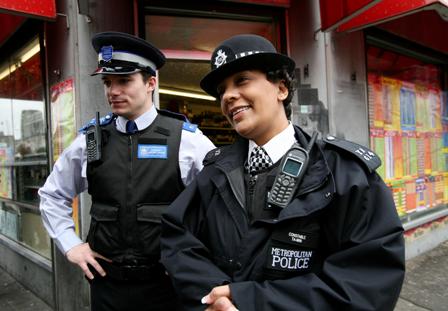
As part of this, the Met has been set a target to improve public confidence by 12%.
The Met has already conducted a lot of work around monitoring and improving public confidence. The Public Attitudes Survey (PAS) has taken place since 1983 and measures Londoners’ experiences and perceptions of policing. Analysis of the PAS and various other research projects has contributed to the development of the Met’s Confidence Model. This identifies the four primary drivers of public confidence as: police effectiveness; engagement; fair treatment; and alleviating ASB.
The current research adopts a more practical, operational stance, looking at what works to improve public confidence ‘on the ground’. Melissa has been part of the fieldwork team in the first research borough, Camden. As part of this fieldwork Melissa has been busy identifying key people to speak to, observing practices at police station front counters, trawling through problem solving analysis documents and conducting interviews with a variety of officers and staff, from problem solving analysts to sergeants and Detective Chief Inspectors.
The highlight so far for Melissa has been a day shadowing a Safer Neighbourhoods Team officer in St Pancras and Somers Town ward. She observed a ‘victim reassurance’ visit with the team, learnt more about how they work alongside the local authority and took part in the after school patrols outside the local secondary school. Melissa is back in the borough one final time to observe the monthly borough performance meeting and interview the borough commander himself.
After the Camden part of the research is completed, other MPS researchers will repeat the same process in two other London boroughs.
Met Forward
After a period of development and design the MPA now has a new information leaflet outlining Met Forward, our mission statement for the Met and how we want London’s police to develop in the coming years. The leaflet is also available on the MPA website at: www.mpa.gov.uk/publications/leaflets/metforward
As ever, we would appreciate your feedback. Please contact us by email at communictions@mpa.gov.uk or by telephone on 020 7202 0217/8.
Supporting material
Send an e-mail linking to this page
Feedback